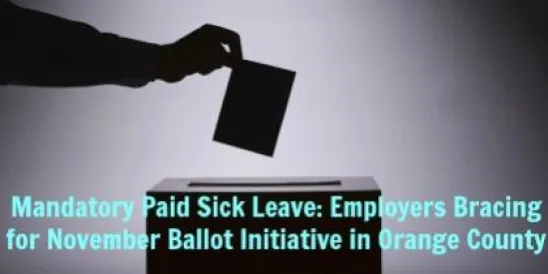Citizens for Greater Orange County (CGOC), a Florida political committee, last week presented the requisite number of signatures needed to garner a spot on the November 6, 2012 ballot in Orange County for a proposed earned paid sick leave ordinance. Bill Cowles, Orange County Supervisor of Elections, verified the final petitions needed for the measure on Friday, August 17, 2012, after determining that the CGOC collected over 50,000 signatures from Orange County registered voters.
If approved by voters, the paid sick leave ordinance would require all employers in Orange County with 15 or more employees to provide each employee with one hour of paid job-protected sick leave for every 37 hours worked, up to a maximum of 56 hours of paid sick leave annually. Smaller employers in Orange County are not required to provide paid sick leave but may not retaliate against any employee who uses up to 56 hours of sick time per year. As a result, the ordinance essentially requires Orange County employers with fewer than 15 employees to provide up to 56 hours of unpaid sick leave annually to each employee.
Under the proposed ordinance, which applies to full and part-time employees, employees could use their paid sick leave for their own illness, diagnosis or preventative medical care, for the care of an ill family member, or to care for their child in the event that a child’s school or day care facility is closed due to a public health emergency. The definition of a family member under the ordinance is quite broad, and includes an employee’s spouse, child, parent, grandparent, grandchild, domestic partner, sibling or other individual related by blood or affinity.
In formal opposition to the sick leave ordinance and in an attempt to block the ballot initiative, a coalition of local chamber of commerce organizations and business associations filed a Complaint for Injunctive and Declaratory Relief in Orange County Circuit Court against the Citizens for Greater Orange County and Bill Cowles, in his official capacity as the Orange County Supervisor of Elections. The crux of the chambers’ and business associations’ argument is that the language of the ballot initiative is misleading to voters and is cost-prohibitive to employers, including the non-profit organizations, charities and religious institutions that also would be covered by the ordinance. According to the Orlando Sentinel, Orange County Mayor Teresa Jacobs and each of the Orange County Commissioners oppose the sick leave ordinance, suggesting that Board of County Commissioners is unlikely to adopt the ordinance which it could do instead of sending the issue to the voters.
Barring a successful legal challenge, Orange County voters will cast their vote for or against the sick leave ordinance in November. In addition to the legal challenge, Orange County voters can expect to see well-organized campaigns on both sides of the issue.
If the sick leave ordinance passes, employers in Orange County will need to analyze their current sick leave and other paid time off policies and implement new or revised policies no later than January 1, 2013, to comply with the ordinance. Lowndes, Drosdick, Doster, Kantor, & Reed, P.A. has a team of employment lawyers who can assist you with that analysis, including the interplay between the sick leave ordinance, related federal and state laws, and your paid time off policies.




 />i
/>i

